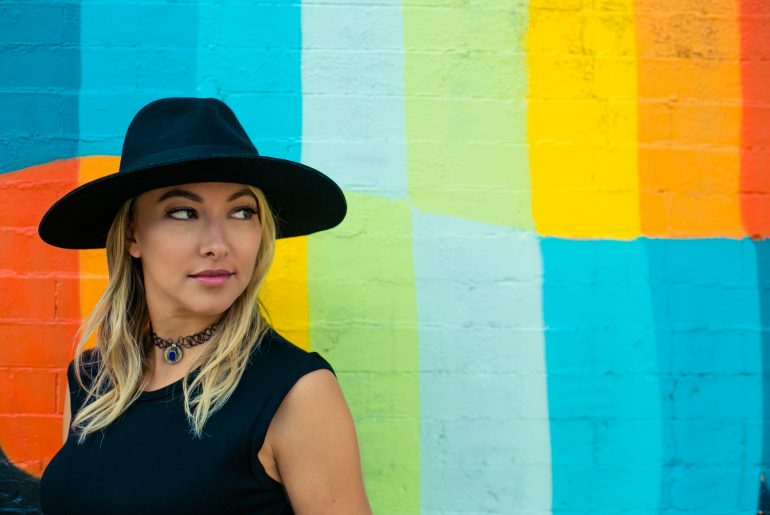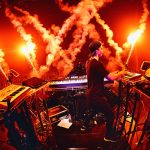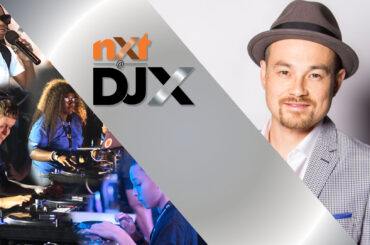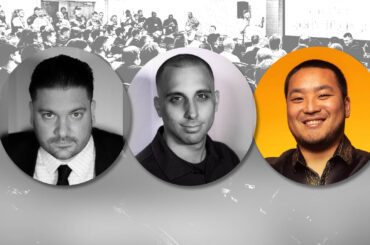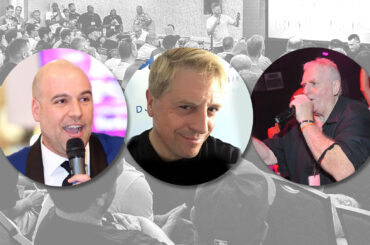When it comes to Lauren Lane, there’s a method to the madness.
Armed with a arsenal of floorfillers and an innate intuition on just how to turn a crowd inside out with the drop of a beat, the Los Angeles-based artist has been one to watch since she first cut her teeth on the New York City club scene years ago. Thanks to her top-notch skills as a selector and key releases on revered labels like Visionquest and Saved Records, she’s caught the approval of—and played alongside—no shortage of industry legends, including Pete Tong, Jamie Jones, and Nic Fanciulli.
Now, the Philadelphia-born DJ/producer is in the midst of a career renaissance, effortlessly riding her ongoing hot streak with no end in sight. Her track “Diary of A Madwoman” (taken from an Edible EP of the same name) has taken off, popping up in the sets of everyone from Marco Carola to Eats Everything. Coupled with some massive gigs—from The BPM Festival to Miami Music Week and beyond—2016 is poised to be one of the biggest years so far for Lane, with a busy summer of performances and releases slated.
We caught up with the busy DJ/producer in a Tribeca loft before her late-night set at the floral-themed BABEL Atmosphere party at The Diamond Horseshoe in New York City earlier this month to chat about her beginnings, setup, and more.
DJ Times: How did you get into DJing?
Lauren Lane: I grew up with music as a prominent part of my life because—from when I was a little kid—my parents’ record collection was amazing: disco, Motown, 70s classic rock. I was just fascinated with records. It was down in our rec room. I remember being really little and being fascinated with this really huge pair of headphones; I was just always drawn to it. When I was a teenager, I played some instruments like the piano and flute, but it never stuck. When I was 15 I went to a club and heard a DJ for the first time, and I was just instantly fascinated. I wanted to know what they were doing and how they were doing it.
DJ Times: Are you from New York?
Lane: I grew up in Philadelphia. I move to New York when I was 18. I was just fascinated with DJ culture. When I moved to New York, I met a couple of DJs and would go record shopping with them and would help them find music. One day, I was just like, “You know what? Why am I helping everyone else? I want to try this myself,” so I started teaching myself how to spin records.
DJ Times: Rob Fernandez played a role in your DJing beginnings, correct?
Lane: I was a waitress at Pacha [New York], and I knew him since before I was even 21—he would get me into the clubs [laughs]. He just always was very nice to me and included me when I was trying to find my place in the scene. When I first started learning how to DJ, I was kind of like, “Rob, I want to DJ!” I don’t think he knew whether or not to take it seriously because I was still kind of like a kid, you know? He did give me a chance—the first gig I had for him was at this party called Asseteria that was on Sundays. I came carrying my records and he just laughed at me because I could barely carry them. After that, he just kept booking me to play at Pacha in the basement, in Pachita, and then finally the main floor, where I started opening for Erick [Morillo] and Danny [Tenaglia]. It was the beginning of everything for me.
DJ Times: What makes the New York clubbing crowd different from anywhere else?
Lane: I think that New Yorkers are super educated. When they go out, they’re going because they really want to hear a DJ or they’re going to go four different places to catch so many different people. In one night, there’s always so much talent here, so I think that if you can make it here, you can play anywhere because New Yorkers are very cynical. If you can win them over, you’re doing okay! In Europe, the music scene has been going for such a long time, so it’s almost the same vibe.
DJ Times: How did you end up in Los Angeles?
Lane: I never thought I would move out of New York; I thought I was a lifer. There was an opportunity when Sound opened [in 2013] for me to go there and become a resident DJ. I just thought it would be nice to check it out. I never thought about moving to LA before, but it was actually a pleasant surprise. I thought I would come kicking and screaming back, but I ended up really liking it. It was a fresh scene—the scene there is an infant compared to New York—and it was cool being part of it. A lot of people were just getting into deep house and tech-house when I was moved there.
DJ Times: Does the early last-call time for the bar out there affect how you play?
Lane: Yeah, because the prime hours are 12-2, which is such a small amount of time. In New York, if you’re DJing you want that later slot because everyone’s more into it and they’ve been drinking a while, so the vibe is a little bit different. It also depends on the party; some of the warehouse parties stay open late. At Sound, you have to stop drinking at 2 AM, but the club stays open until 4 AM, so the die-hard music people stay which is cool. The people who are just there for drinks, obviously they leave.
DJ Times: You were a resident at the club for a while. What’s it like to go from opening a club to playing headlining sets there?
Lane: I’m very thankful for all of the years I opened because there is a sort of respect level and art to it, and I think it trains you to be a good DJ and a conscious DJ. Now, I still take that into my judgment when I play because I like so many different kinds of music, so I like to take the opportunity when I play a smaller room to play some deeper vibes. Like when I play BABËL tonight, I’m going to play a little differently than when I play a huge festival, and I have all different sorts of music, so it’s nice to be able to go into the arsenal or vault and pick and choose depending on the scene and setting.
DJ Times: You seem to have a knack for being able to switch up the energy levels of a crowd at the drop of a hat. Is that what you’re aiming to do when you’re DJing?
Lane: Honestly, I just try to feel what I think should come next. I don’t pre-plan a “1, 2, 3, 4, 5” setlist, I just kind of go with the flow. I have different playlists, and I’ll know “Oh, this is working now, so I’ll keep going down that route” or I’ll just change it up if I feel that the room is ready for a shift.
DJ Times: You’ve been very involved with BPM Festival down in Mexico. What’s it like to see that grow to the event that is today?
Lane: Next year will be the 10th year, yeah. I think that no one thought that it would become this big. It’s become this kind of benchmark for an underground music festival now, especially on this side of the world. People are coming from everywhere to come to it, so it’s a very international thing, which is great to see. It started out just being people from Montreal and Toronto, and then New Yorkers started coming, and then it was Miami and Chicago, and now it’s just worldwide.
DJ Times: It was more of an industry event to begin with, right?
Lane: Well it stands for “Bartenders, Promoters, Musicians,” because they wanted it to be an industry thing for after New Year’s. That’s the peak of busy season for a lot of people that work in the industry, and they wanted somewhere for people to go to unwind. Now it’s so much more than that.
DJ Times: You’ve produced in the past for labels like No.19, Visionquest, and Saved, but it seems like the release of “Diary of a Madwoman” was a very big coming out moment for you this year. How did the track and EP come to be?
Lane: I have a lot music that I’ve worked on over the last few years that I haven’t released because I like it but I don’t want to release anything unless I really like it. That track, from the moment I started testing it in sets, always got a good reaction, and I always felt good playing it. With that combination, I had a good feeling about it. The title is fun, and I think that everyone has that mad side to them. And it has that hooky little part that’s melodic enough so that it’s memorable—it’s not just a straightforward beat—but it works in a lot of different types of sets so a lot of different people can play it even if their sound is different. From the EP, that’s my favorite track by far, but it’s interesting to hear from different people which track is their favorite.
DJ Times: It’s on Eats Everything’s new Edible imprint. How did the track get in his hands?
Lane: They actually approached me and said that they were starting a label and were looking for newer, fresh artists, and they just asked me to send them music. I sent them six tracks and they literally got back to me that day. I remember I was DJing in Hawaii. It was the day before I was playing so I was on a fun excursion day, and they got back to me saying they were signing the EP and I was so happy. It was a good day.
DJ Times: And you’ve got more productions coming out this year?
Lane: Yeah.
DJ Times: You play regularly at parties thrown by a variety of different labels and collectives, including Guy Gerber’s Rumors, Jamie Jones’ Paradise, and Nic Fanciulli’s Saved Records. How did you find yourself playing there and how do you find your niche in them?
Lane: To be honest, the DJs that are involved in those parties I have looked up to for a while. It worked out, just becoming friends with them and then them actually hearing me DJ and liking how I played or liking my music and being like, “Hey, let’s give her a shot.” I’m friends with them, but they set the bar high in the industry, so I’m just thankful that they respect me enough to book me.
DJ Times: From a gear perspective, your DJing setup is a laptop, Traktor, and a pair of Pioneer CDJs. What attracted you to that setup?
Lane: I started with vinyl, but I switched to CDJs when all the record stores in New York started closing. At that time, it was very expensive for me to always be ordering records, so the ease of digital took over. I switched to Traktor because of the functions that CDJs don’t have—like some of the looping and Beat Jump and the ease of being able to try and find tracks in a second. I’m not the most organized person all the time, so I like to be able to go, “Oh yeah! What’s that track” and then I can just search it and find it. But now, the new [CDJ-2000NXS2’s] are so crazy; they have a touch screen with a search function, so I’m actually switching back to just USBs and rekordbox because it’s just so much easier than having to bring Traktor and a laptop.
DJ Times: What do you have planned going into summer and fall?
Lane: I’m going to be having another release on Saved. The track, which I think is going to be the title track, is called “Mantra 304.” I have another release for Edible in the pipeline, and also one with 2020 Vision. That one is going to have a track with JAW, who I’ve worked with on “Lazer Eyez” for Visionquest for my first release and also a track on No.19. It’s nice having another track coming out with him; we really like working together. The track is called “Edge of Sideways.” It’s about a really fun night out we had [laughs].
Watch the video for “Diary of A Madwoman” below.


